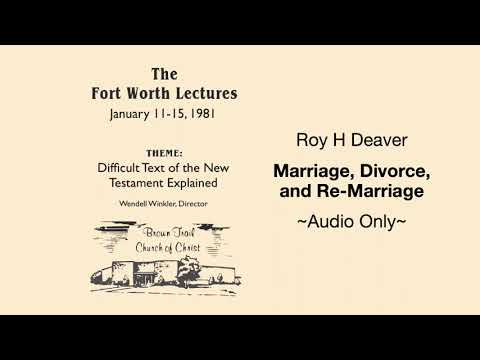Does Matthew 19:9 Apply Only to Christians Married to Christians? An Examination of 1 Corinthians 7
Notes from a sermon by Roy H Deaver
Introduction
There is an ongoing discussion among brethren about the application of Matthew 19:9, where Jesus gives the sole exception allowing divorce and remarriage - fornication. Some believe Matthew 19:9 is a "covenant passage" that applies only when both spouses are Christians. They use 1 Corinthians 7:10-13 to try to prove this view.
Examining this issue is crucial to properly understand the universal application of Matthew 19:9. If Matthew 19:9 does not apply to non-Christians or mixed marriages between a Christian and non-Christian, it would have major implications. It would mean a person's previous marriages, divorces and remarriages before becoming a Christian would not matter. They could remain with whoever they are married to when they become a Christian.
Overview of 1 Corinthians 7
To understand the context, let's overview the entire chapter of 1 Corinthians 7. In it, Paul answers a series of questions the Corinthians had asked about marriage:
Verses 1-7: Is marriage itself right before God? Yes, though singleness is also good. Husbands and wives should fulfill marital duties to each other.
Verses 8-9: Should widows and widowers remarry? Yes, if they lack self-control. It is better to marry than burn with passion.
Verses 10-11: Should marriages be disrupted? No, but if separation occurs, remain unmarried or be reconciled. This charge is from the Lord.
Verses 12-13: Should a Christian married to a non-Christian leave them? No, if the unbeliever is content to stay. This is Paul's inspired judgment.
Verses 14-16: What if the unbeliever departs? Let them depart; the believer is not under bondage in such cases. God has called us to peace.
Verses 17-24: Does becoming a Christian require changing one's social status? No, remain in the state you were called, whether circumcised, uncircumcised, slave or free.
Verses 25-38: Is it better for the unmarried to remain single? Yes, in light of the present distress, but marrying is not sin. It is good to remain as you are.
Verses 39-40: Can a widow remarry? Yes, but only "in the Lord." Remaining unmarried may be happier.
Do 1 Corinthians 7:10-13 Prove Matthew 19:9 Applies Only to Christian Marriages?
Some argue 1 Cor. 7:10-11 refer to two Christians married to each other, and that 1 Cor. 7:12-13 address "mixed marriages" between a Christian and non-Christian. Therefore, they say Matthew 19:9 must also apply only to Christian marriages.
The reasoning goes like this:
If 1 Cor. 7:10-11 apply only to Christians married to Christians,
And if Matthew 19:9 is identical in application to 1 Cor. 7:10-11,
Then Matthew 19:9 applies only to Christians married to Christians.
However, this argument makes several unfounded assumptions:
It assumes 1 Cor. 7:10-11 apply only to Christian marriages. But Paul addresses instructions to "the married" in general, not just Christians married to Christians. The instructions apply in principle to both fully Christian and mixed marriages.
It assumes Matthew 19:9 is identical to 1 Cor. 7:10-11. But Matthew 19:9 gives a specific exception to the general rule stated in 1 Cor. 7 and Matthew 19:6 - "What God has joined together, let not man separate." 1 Cor. 7:10-11 repeats the general rule, while Matthew 19:9 gives the exception for fornication.
It assumes God's marriage law does not apply to non-Christians. But God's word repeatedly shows that all people are accountable to God's law on marriage (e.g. Herod and Herodias in Mark 6:18).
When examined closely, 1 Cor. 7:10-11 do not prove Matthew 19:9 is limited only to Christian marriages. The instructions relate to all marriages in principle[1].
The Meaning of "Not Under Bondage" in 1 Corinthians 7:15
1 Corinthians 7:15 is a key verse in this discussion. It states that if an unbelieving spouse departs, the believer is "not under bondage." What does this mean?
The Greek word used here for bondage is douloo, which is different than the usual word for the marriage bond (deo)[1]. In the New Testament, douloo never refers to the marriage bond itself[1].
Instead, douloo means the believer is not so enslaved to the unbeliever that they must give up their faith in Christ to preserve the marriage[1]. The perfect tense also shows the believer is not now and never has been under this type of bondage to an unbeliever[1].
This bondage cannot refer to the marriage bond, because the believer was indeed bound in marriage to the unbeliever. Verse 15 means the believer is not bound to give up Christ to keep the unbelieving spouse[1].
Conclusion
In conclusion, 1 Corinthians 7:10-13 do not prove Matthew 19:9 is limited only to Christian marriages. A careful examination shows:
1 Cor. 7:10-11 refer to all marriages in principle, not just Christian marriages[1].
Matthew 19:9 is not identical to 1 Cor. 7:10-11, but gives a specific exception to the general rule stated in 1 Cor. 7:10-11 and Matt. 19:6[1].
The "bondage" in 1 Cor. 7:15 is not the marriage bond itself, but a bondage to an unbeliever that would require giving up one's faith[1].
Matthew 19:9 states a universal principle that applies to all marriages, not a covenant only for Christians. Understanding this is crucial to properly applying Jesus' teachings on marriage, divorce and remarriage. We must handle Jesus' words carefully and consistently, not selectively applying them only to some.
Citations:


